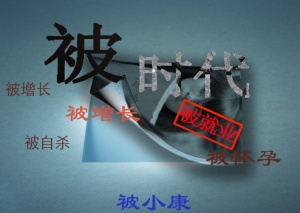“Passive era”的版本间的差异
来自China Digital Space
| 第1行: | 第1行: | ||
被时代 (bèi shídài): Era of the passive tense | 被时代 (bèi shídài): Era of the passive tense | ||
| − | + | [[File:Eraofpassivetense.jpg|300px|thumb|left]] A time when euphemistic labels are given to actions that belie the underlying compulsion behind those actions--that is, the present. | |
| − | In Chinese, the grammatical construction bei-X means | + | In Chinese, the grammatical construction ''bei''-X means “to be Xed“ or ”to be forced to X.“ Netizens have coined a [http://chinadigitaltimes.net/space/Be_represented,_be_suicided,_be_increased,_be_GFWed,_be_XXed number of terms] using this construction, giving rise to the “era of the passive tense.” |
| − | |||
| − | |||
| − | |||
| − | |||
| − | |||
| − | |||
[[Category: Grass-Mud Horse Lexicon]] | [[Category: Grass-Mud Horse Lexicon]] | ||
2012年11月19日 (一) 21:32的版本
被时代 (bèi shídài): Era of the passive tense
A time when euphemistic labels are given to actions that belie the underlying compulsion behind those actions--that is, the present.
In Chinese, the grammatical construction bei-X means “to be Xed“ or ”to be forced to X.“ Netizens have coined a number of terms using this construction, giving rise to the “era of the passive tense.”





